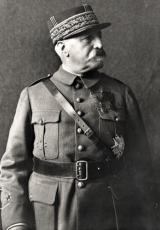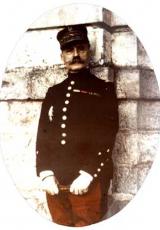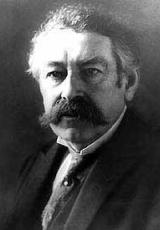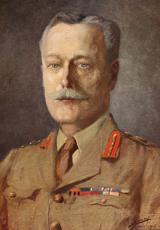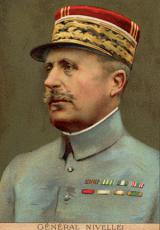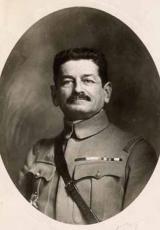Joseph Joffre
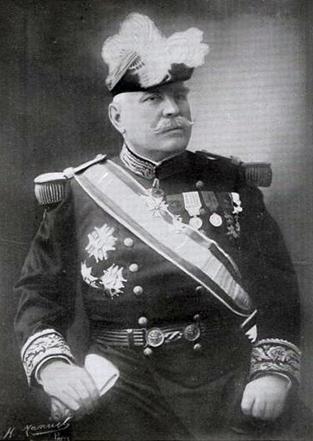
Born in Rivesalter on January 12th 1852, Joseph Joffre proved to be a brilliant pupil and entered the Ecole Polytechnique (Polytechnic School) at the age of 17. Taking up the military career, he chose the Engineer Corps, which best corresponded to his engineering capacities. After the war of 1870-71, he contributed in the fortification of Paris, enlarged by Séré de Rivières. From here he will leave on 1874 to the colonies. In 1885 he was captain of Indochina, where he participated in the Tonkin campaign and was decorated with the Legion of Honour on September 1985. In the role of sapper he fortifies the Formose island, which at the time was the fleet base of Admiral Courbet. In 1892 in the French Sudan, he created railways Then in the framework of the operations against sultan Samory he conquers Timbuktu. Later he was appointed colonel, under General Galliéni and fortified the Diego-Suarez harbour in Madagascar.
Appointed major general, he reached the position as engineering director of the ministry of war in 1905; after other important assignments such as chief of the 2nd army corps , he became member of the higher Council of war and on 1911 he was appointed chief of staff and future commander-in-chief in the event of a conflict. From this important position he had the possibility to reform the army, the doctrine, the rules, the material, the manpower, the mobilization, etc. he didn't miss any aspect. He reinforced the defence of the country, conscious of an increasingly German threat. With this aim in view, he was a convinced supporter of the military alliance with imperial Russia and who furthermore reinforced this connection in 1913. The hostilities with the II Reich broke out on April 3rd 1914, when Germany declared war to France. The operations started in the East as well as in the West and this conflict soon turned to be of a world dimension. Joffre adopted his Plan XVII from Alsace to Belgium. During the battle known as "border battle" he will suffer heavy retreats, by the time he managed to produce an offensive operation the army had already reached the Parisian suburbs, the Marne and beyond, then stopped in Ourcq, Verdun and on the frontline beyond Nancy, Epinal and Belfort. His armies and generals with the support of the English army, won the Marne battle from the 5th to the 12th September 1914. He led this battle with his general staff and thanks to Gallieni's initiative, governor of Paris.
Then, after the "race to the sea" thanks to General Foch and the support of the British and Belgians, he manages to create a troop barrier, blocking the Calais road in Dixmude on Yser. On November 26th 1914 he received the Military Medal. Once stabilized the battle got stuck on a front of 770 km and became siege war which he led from his General Headquarter in Chantilly, facing also the ammunition and material crises. He succeeded to equip his troops of better arms, uniformes and in particular Adrian helmets, 58 mm trench mortars, hand grenades, gas madks, Chauchat machine guns, Berthier rifles, heavy Schneider and Saint-Chamond tanks, etc.
In 1916 he commanded the entirety of the French armies and no longer only those of the north-eastern front. For several months he had been coordinating the offensive operations with those of the English, Italian and Russian allies, as he was convinced of the advantage of imposing the fact of common actions onto the central empires. In 1916 he led an imperturbable defence in Verdun, thanks to the Generals Castelnau and Pétain and in Somme he passed then to the offensive with Haig, Foch and Foyolle Launching in Verdun the offensives Nivelle-Mangin, in autumn he takes Fleury, Douaumont and Vaux back. Despite everything, in December 1916, the president of the Council, Astrid Briand, replaced him by General Nivelle. Joffre was promoted to the post of Marshal of France.
Keeping its uncontested fame to the allies, Joffre was used in 1917 by the French government as military adviser for the Viviani mission, in charge to integrate the Americans in the conflict. Later he was appointed general Inspector of the U.S. troops in France. Here he had to judge their improvement in the training of the trenches fight, as well as in the utilization of the new arms. On November 13th November 1918, the Unites States decorated him with the Distinguished Service Medal. Once the war was won and the peace signed, Joffre led the Victory procession of July 14th 1919 in Paris. Then he devoted himself to his memoirs and is journeys, he was elected to the French Academy and worked until his last days. He died in 1931 at the age of 79. He was honoured with a state funeral and was buried in his property in Louveviennes (Yvelines) where he still rests.
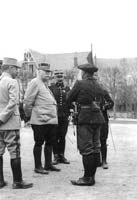
Le maréchal Joffre Photo DMPA CEROD
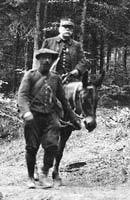
Joffre à dos de mule (1916) Photo DMPA Cerod


